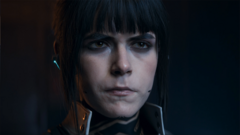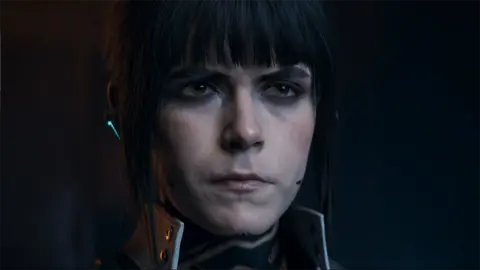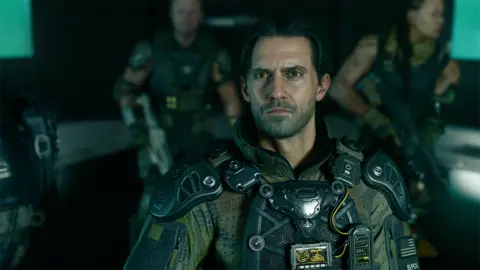Call of Duty is back, and it’s got a battle on its hands

Tom Richardson,BBC Newsbeat and
Mel Ramsay,BBC News
 Activision
ActivisionThere are some things you can always rely on, and a new Call of Duty game coming out each year is one of them.
As one of the best-known names in video games, it’s a series that needs little introduction.
According to publisher Activision, it’s sold an estimated 500 million copies, a movie adaptation is on the way, and despite having launched in 2003 it still reliably appears at – or near – the top of the annual bestseller charts.
But this year the world’s top military shooter might have a fight on its hands.
Battlefield 6, which has been a huge hit for rival gaming giant Electronic Arts, has been drawing attention away from its veteran competitor.
And long-time Call of Duty fans have been increasingly vocal over worries about the series losing touch with its routes.
The clash of the multiplayer titans comes at an interesting time for the makers of Call of Duty, who’ve had to issue responses to fan concerns about the series losing its way.
It has long offered players the chance to purchase “operator skins” that change their character’s appearance.
They’re a frequent source of brand crossovers, and previous designs have been based on stars including footballer Neymar Jr, streamer NickMercs and rapper Nicki Minaj.
But when Activision revealed skins based on 90s cartoon characters Beavis and Butthead earlier this year, there was a backlash.
Fans accused the company of trying to mimic Fortnite, the ever-popular multiplayer game famous for its sometimes unlikely crossovers, which have included pop star Sabrina Carpenter and an AI-voiced Darth Vader in 2025.
Activision said the feedback from fans “hit home” and that it took the complaints about the series losing its identity seriously.
It’s also being released after parent company Microsoft increased prices of its Game Pass subscription service by 20%, angering many players.
 Activision
ActivisionWhen BBC News sits down with lead producer Natalie Pohorski and senior comms director Stephanie Snowdon, they’re keen to talk up Black Ops 7’s single-player story campaign.
The equivalent mode in Battlefield 6 was considered underwhelming by reviewers, and Call of Duty teams are renowned for their skill in crafting explosive set pieces in their narrative modes.
Black Ops-themed installments of the series usually tell Hollywood blockbuster-style stories of secret agents uncovering vast conspiracies.
Black Ops 7 is a direct sequel to 2012’s Black Ops 2, set in 2035 and tells a story involving a global terrorist threat and a murky big tech company.
Natalie says that the “Black Ops identity” allows the developers to explore themes that others can’t.
“There’s a lot of really interesting and timeless ideas… there’s endless ways to explore them,” she says.
“And then we ask a lot of questions that could apply to any era – questions of trust, can you believe what you’re seeing?”
 Activision
ActivisionBeing one of the biggest names in gaming also allows Activision to attract some big-name talent to Call of Duty projects.
For Black Ops 7, that includes Kiernan Shipka, best known for her role in Netflix’s Chilling Adventures of Sabrina, and This Is Us star Milo Ventimiglia.
Kiernan tells BBC News she’s aware of Call of Duty’s huge profile, and the expectations of its fans.
She says being involved was “honestly more exciting than anything.”
“I love a fandom,” she says.
“And I think that when something over time garners such passion from fans, that means you’re stepping into something really cool.
“The reaction is going to be what the reaction is going to be.
“If I let that stuff in, that’s not a good thing.”
As someone who played Call of Duty when he was younger, Milo says he’s also aware of the standards fans have.
“I mean, I hope I don’t muck it up for anybody,” he says.
Asked whether he thinks players are getting “fatigued” with the annual series, he says Black Ops 7 won’t disappoint.
“I think this one just blows the others out of the water completely in the storytelling and where we go,” he says.
But Call of Duty’s campaigns, no matter how well-crafted or explosive they are, aren’t the main reason players turn up for the series each year.
The game owes its long-running success to the popularity of its multiplayer modes, and the performance of Black Ops 7 will be judged on whether they succeed.
When they’re asked if Battlefield’s impressive player numbers affect their approach to development, Natalie and Stephanie insist they’re only focused on making Black Ops 7 “the best game it can be”.
As for what it offers that Battlefield can’t, Stephanie says, without directly comparing the two, that Call of Duty has “variety and volume” of experiences to offer.
“But more broadly, she says, “I see games as a way for people to connect, to have fun.
“They are certainly responsible for some awesome relationships in my life.
“I hope that people continue to forge those connections and bonds and relationships and there’s just more of us playing games together in however many years from now.”


